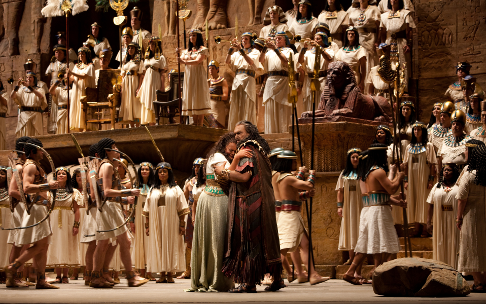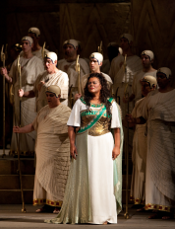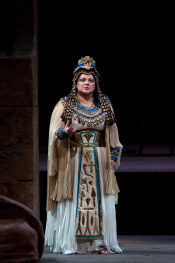![Johan Botha as Radames [Photo by Marty Sohl courtesy of The Metropolitan Opera]](http://www.operatoday.com/AIDA_Botha_1686.png)
15 Oct 2009
Aida at the MET
Noblesse oblige: The Met feels it must present Aida — and Tosca — and La Bohème — and certain other gaudy spectacles — because it’s the Met and everyone expects the grandest of the grand.
English Touring Opera are delighted to announce a season of lyric monodramas to tour nationally from October to December. The season features music for solo singer and piano by Argento, Britten, Tippett and Shostakovich with a bold and inventive approach to making opera during social distancing.
This tenth of ten Live from London concerts was in fact a recorded live performance from California. It was no less enjoyable for that, and it was also uplifting to learn that this wasn’t in fact the ‘last’ LfL event that we will be able to enjoy, courtesy of VOCES8 and their fellow vocal ensembles (more below …).
Ever since Wigmore Hall announced their superb series of autumn concerts, all streamed live and available free of charge, I’d been looking forward to this song recital by Ian Bostridge and Imogen Cooper.
The Sixteen continues its exploration of Henry Purcell’s Welcome Songs for Charles II. As with Robert King’s pioneering Purcell series begun over thirty years ago for Hyperion, Harry Christophers is recording two Welcome Songs per disc.
Although Stile Antico’s programme article for their Live from London recital introduced their selection from the many treasures of the English Renaissance in the context of the theological debates and upheavals of the Tudor and Elizabethan years, their performance was more evocative of private chamber music than of public liturgy.
In February this year, Albanian soprano Ermonela Jaho made a highly lauded debut recital at Wigmore Hall - a concert which both celebrated Opera Rara’s 50th anniversary and honoured the career of the Italian soprano Rosina Storchio (1872-1945), the star of verismo who created the title roles in Leoncavallo’s La bohème and Zazà, Mascagni’s Lodoletta and Puccini’s Madama Butterfly.
Evidently, face masks don’t stifle appreciative “Bravo!”s. And, reducing audience numbers doesn’t lower the volume of such acclamations. For, the audience at Wigmore Hall gave soprano Elizabeth Llewellyn and pianist Simon Lepper a greatly deserved warm reception and hearty response following this lunchtime recital of late-Romantic song.
Collapsology. Or, perhaps we should use the French word ‘Collapsologie’ because this is a transdisciplinary idea pretty much advocated by a series of French theorists - and apparently, mostly French theorists. It in essence focuses on the imminent collapse of modern society and all its layers - a series of escalating crises on a global scale: environmental, economic, geopolitical, governmental; the list is extensive.
For this week’s Live from London vocal recital we moved from the home of VOCES8, St Anne and St Agnes in the City of London, to Kings Place, where The Sixteen - who have been associate artists at the venue for some time - presented a programme of music and words bound together by the theme of ‘reflection’.
'Such is your divine Disposation that both you excellently understand, and royally entertaine the Exercise of Musicke.’
Amongst an avalanche of new Mahler recordings appearing at the moment (Das Lied von der Erde seems to be the most favoured, with three) this 1991 Mahler Second from the 2nd Kassel MahlerFest is one of the more interesting releases.
‘And there was war in heaven: Michael and his angels fought against the dragon; and the dragon fought and his angels, And prevailed not; neither was their place found any more in heaven … that old serpent … Satan, which deceiveth the whole world: he was cast out into the earth, and his angels were cast out with him.’
If there is one myth, it seems believed by some people today, that probably needs shattering it is that post-war recordings or performances of Wagner operas were always of exceptional quality. This 1949 Hamburg Tristan und Isolde is one of those recordings - though quite who is to blame for its many problems takes quite some unearthing.
There was never any doubt that the fifth of the twelve Met Stars Live in Concert broadcasts was going to be a palpably intense and vivid event, as well as a musically stunning and theatrically enervating experience.
‘Love’ was the theme for this Live from London performance by Apollo5. Given the complexity and diversity of that human emotion, and Apollo5’s reputation for versatility and diverse repertoire, ranging from Renaissance choral music to jazz, from contemporary classical works to popular song, it was no surprise that their programme spanned 500 years and several musical styles.
The Academy of St Martin in the Fields have titled their autumn series of eight concerts - which are taking place at 5pm and 7.30pm on two Saturdays each month at their home venue in Trafalgar Square, and being filmed for streaming the following Thursday - ‘re:connect’.
The London Symphony Orchestra opened their Autumn 2020 season with a homage to Oliver Knussen, who died at the age of 66 in July 2018. The programme traced a national musical lineage through the twentieth century, from Britten to Knussen, on to Mark-Anthony Turnage, and entwining the LSO and Rattle too.
With the Live from London digital vocal festival entering the second half of the series, the festival’s host, VOCES8, returned to their home at St Annes and St Agnes in the City of London to present a sequence of ‘Choral Dances’ - vocal music inspired by dance, embracing diverse genres from the Renaissance madrigal to swing jazz.
Just a few unison string wriggles from the opening of Mozart’s overture to Le nozze di Figaro are enough to make any opera-lover perch on the edge of their seat, in excited anticipation of the drama in music to come, so there could be no other curtain-raiser for this Gala Concert at the Royal Opera House, the latest instalment from ‘their House’ to ‘our houses’.
"Before the ending of the day, creator of all things, we pray that, with your accustomed mercy, you may watch over us."
![Johan Botha as Radames [Photo by Marty Sohl courtesy of The Metropolitan Opera]](http://www.operatoday.com/AIDA_Botha_1686.png)
Noblesse oblige: The Met feels it must present Aida — and Tosca — and La Bohème — and certain other gaudy spectacles — because it’s the Met and everyone expects the grandest of the grand.
The dearth of grand Verdi sopranos and tenors from the current opera scene does not deter. This has led to some somnambulistic Aidas in recent years, but the current revival, spiffed up and to an extent restaged by Stephen Pickover with new choreography by ABT’s Alexei Ratmansky plus a new conductor, Daniele Gatti, makes it a more satisfying evening than many Aidas of recent years. To top it off — this should be basic, but in fact it’s rare — five good singers with great big voices perform the leading roles. How often does that happen?
One detail may indicate how rethinking little things can improve a whole performance. Act IV, scene 1, the Judgment Scene of Aida: Amneris sits stage front, all headdress and nerves — the man she loves, Radames, is just offstage, on trial by the priests for having betrayed Egypt. Not coincidentally, he has also betrayed Amneris, his fiancée, for love of the slave girl Aida, secretly daughter to the Ethiopian king. Three times, high priest Ramfis reads the charges … and Radames refuses to reply. “He does not answer,” Ramfis says, and the priests cry, “Traitor!” — to which Amneris responds with rising hysteria, ever more desperate to save the man she still loves — who is condemned to burial alive. A brief drum roll crescendo covers the space between each of Ramfis’s questions and the bald statement: “He does not answer.” Verdi assumed conductors would understand the excitement of the moment … and hold onto it as long as they could. James Levine used to drive me crazy at this point, always jumping the gun as if, knowing Radames isn’t going to answer, he saw no reason to wait for it. The reason to wait is because it’s drama — tension in the theater is gold, never something to toss heedlessly away.
In the current run, Daniele Gatti sits on those brief pauses over low timpani rolls for several jittery seconds, giving us time to sit up and chew our nails. Dolora Zajick, the Amneris, clutches an idol and twists her jewels, and we get the little jolt just as Verdi planned. Sweet.
 Violeta Urmana as Aida and Carlo Guelfi as Amonasro
Violeta Urmana as Aida and Carlo Guelfi as Amonasro
This makes up for some scrappy work from Gatti and the orchestra elsewhere, ill-balanced horns blaring in the prelude, a flute coming in a bar too early in the ballet — is the Met bored with this opera? They’ve given it over eleven hundred times and last Columbus Day (or Verdi Day, as William Berger has suggested it be renamed, to honor the composer’s birthday on the tenth) the Met was playing to a packed house. There was, however, a sense — on the third Aida of the run! — that Maestro Gatti had not settled matters of tempo with his singers or was still changing his mind. Phrases were sometimes rushed when the singers seemed to wish to linger, or held back while they barreled ahead. Johan Botha’s Radames did not find the music waiting for his voice on his Act III entrance and had to hurry along to catch it up. Also, though this is not Gatti’s fault but director Pickover’s, during the triumphal procession of Act II, the many squadrons of soldiery marathoned past Pharaoh at such a pace that there is no time to pause to bow to their sovereign on the reviewing stand. Were I the king, I’d send the whole lot off to the papyrus mines.
Despite these lapses, it was about as solid an Aida as may be heard on these shores nowadays, the sets monumental as ever, the enormous Met forces appearing even more numerous than they were (two horses lead the procession, plus another to pull the chariot), the five leading roles sung by big voices, each well able to fill the enormous room.
 Violeta Urmana as Aida
Violeta Urmana as Aida
Violeta Urmana, the night’s Aida, has a sumptuous soprano with a warm
glow to it — she doesn’t have to push to flood the house with
sound, and she glides into lovely piano phrases of nostalgia for Ethiopia or
when fading to death in the tomb. These perfect, purling phrases are not always
to be depended upon, however — a line or two of “O patria
mia” peeled paint and elsewhere she dipped into flatness, and she
sometimes ran out of breath on a high note. Then, just as you thought
she’s simply a soprano with a “short top,” she launches a
flawless legato over the very roof of her range. Aida is a long role with a lot
of high floating notes alternated with deep descent, and the leaps in dynamics
from one emotion or range to a contrasting one, and these abrupt alterations
appear to trouble her. Still, for long stretches of the night, she was the big,
beautiful Aida the world yearns for.
 Dolora Zajick as Amneris
Dolora Zajick as Amneris
Dolora Zajick has sung seventy Amnerises at the Met — if the company
still went on tour (and didn’t the provinces always demand
Aida?) she’d be neck and neck with the champ, Louise Homer, who
sang it ninety-seven times from her debut in 1900. Zajick’s clarion mezzo
still soars, wobble-free, and in the Act II concertato she is louder than the
massed populations of Egypt and Ethiopia. One wishes she could change costume
to suit the change in mood between Acts III (wedding night) and IV (crisis),
but the production now subsists on two intermissions instead of three, and
probability must be sacrificed.
Johan Botha has both the voice and the girth to keep his ladies in their places. His fresh, stalwart, graceful singing is just a bit unvaried for some tastes, but I can’t remember when I last heard “Celeste Aida” sung or phrased so beautifully — that is, until the final fading pianissimo, which concluded in a bobble that, one fears, defused an impending ovation. As mentioned above, he began his love duet a measure or two late, but otherwise sang it persuasively if lacking dramatic fire. Verdi’s music may require a more throbbing emotional urge, and may not be quite as ideal for Botha as Wagner’s Walther or Strauss’s Apollo. Still, in so big and vocal an opera as Aida, it’s a pleasure to hear a tenor so well matched with his soprano and mezzo. His acting, however, is minimal and stiff, his instincts less than sure — do we need that basketballer’s upraised double-fisted “Yessss” when he is named to command Egypt’s armies?
Carlo Guelfi makes a sturdy Amonasro, if a bit rough and ready — but this is not a suave part. Roberto Scandiuzzi makes a dignified if not ideally sonorous Ramfis. Stefan Kocán, a debutante Pharaoh, sounds out of place and weak among these five mature voices. Adam Laurence Herskowitz sings an admirable Messenger.
Alexei Ratmansky has devised new dances for the ballets of Act II. The dance for Amneris is a well-played classic pas de deux that might surprise those used to girls in this lively bit, who thought men were barred from oriental harems — be generous: the boy might simply be a eunuch. The ballet for the triumphal scene fell rather on the Russian side of a compromise between traditional ballet moves — which do seem odd in a monumental Egyptian setting — and any attempt to be “faux Egyptian” or “faux African.” Both dances made much of Verdi’s striking rhythms, and the corps de ballet (as in last year’s La Gioconda) showed what a little attention from a genuine ballet master will produce.
John Yohalem